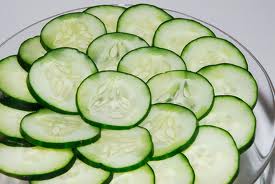Cucumbers are the forth most widely cultivated vegetable in the world. Wikipedia says “There are three main varieties of cucumber: “slicing”, “pickling”, and “burpless”. Within these varieties, several different cultivars have emerged. The cucumber is originally from India, but is now grown on most continents. Many different varieties are traded on the global market.”
 As far as the commercial market goes there are two types of cucumbers, slicing and pickling. The slicing kind have a thicker skin and are larger than the pickling kind of cucumber.
As far as the commercial market goes there are two types of cucumbers, slicing and pickling. The slicing kind have a thicker skin and are larger than the pickling kind of cucumber.
Nutrition
We on the Farm are most interested in what the cucumber can do for us. First of all a 100 grams of cuc (3.5 oz) has about:
16 cal,
3.63 g of Carbohydrates,
1.67 g of sugar,
.5 g of fiber
.11 g of fat
.65 grams of Protein.
Health
Let me get scientific for a brief moment. According to the following article in the “World’s healthiest foods” site cucumbers are beneficial because:
- Researchers have long been familiar with the presence of unique polyphenols in plants called lignans, and these health-benefiting substances have been studied extensively in cruciferous vegetables (like broccoli or cabbage) and allium vegetables (like onion or garlic). Recent studies, however, have begun to pay more attention to the lignan content of other vegetables, including cucumbers. Cucumbers are now known to contain lariciresinol, pinoresinol, and secoisolariciresinol–three lignans that have a strong history of research in connection with reduced risk of cardiovascular disease as well as several cancer types, including breast, uterine, ovarian, and prostate cancers.
- Fresh extracts from cucumbers have recently been show to have both antioxidant and anti-inflammatory properties. While research in this area must still be considered preliminary–since it’s only been conducted on animals in a lab setting–the findings are clear and consistent. Substances in fresh cucumber extracts help scavenge free radicals, help improve antioxidant status, inhibit the activity of pro-inflammatory enzymes like cyclo-oxygenase 2 (COX-2), and prevent overproduction of nitric oxide in situations where it could pose health risks. It’s highly likely that cucumber phytonutrients play a key role in providing these antioxidant and anti-inflammatory benefits, supporting health alongside of the conventional antioxidant nutrients--including vitamin C, beta-carotene, and manganese of which cucumbers are an important source.
- As a member of the Cucurbitaceae family of plants, cucumbers are a rich source of triterpene phytonutrients called cucurbitacins. Cucurbitacins A, B, C, D and E are all contained in fresh cucumber. They have been the subject of active and ongoing research to determine the extent and nature of their anti-cancer properties. Scientists have already determined that several different signaling pathways (for example, the JAK-STAT and MAPK pathways) required for cancer cell development and survival can be blocked by activity of cucurbitacins. We expect to see human studies that confirm the anti-cancer benefits of cucumbers in the everyday diet.
Use
Store your cucumbers in the refrigerator and use them within a few days. Once you’ve cut into the cuc wrap it with plastic or put it in a bag to prevent it from drying out. Make sure you clean your cuc before you eat it because store bought cucs are usually waxed to make them look better. It is a good idea to buy organically grown cucumbers to limit your exposure to chemicals. Organically grown cucumbers can be waxed also, but only with non-synthetic waxes.
Some people remove the skin and seeds and there is nothing wrong with that except for the loss of vitamins and minerals contained in the skin and seeds. If you buy regular cucumbers you should remove the skin to avoid chemical consumption. Organic cucs can be eaten whole if washed properly. Some people remove the seeds because the seeds have been know to cause gas or “burping” in some of us or they can be tough and hard to chew in older cucumbers.


4 comments
I love cucumbers! Breakfast this morning was a cucumber sandwich – Sara Lee Delightful bread, roasted red pepper hummus instead of mayo, sliced tomatoe and cucumbers. Yummo! I had to use a knife and fork to finish eating it because it was so messy and delicious!
Sounds Great Kathy, thanks for the post. I never could get into hummus in the past, maybe I’ll experiment with it now. The roasted red pepper part sounds amazing, I can smell them roasting.
I wasn’t a hummus fan in the past either, but my quest for better health this year has re-introduced me to it, and now I love it! Our tastes must change over time maybe?
You pretty much said what i could not effectively communicate. +1
My site:
rachat pret hypothecaire http://www.rachatdecredit.net